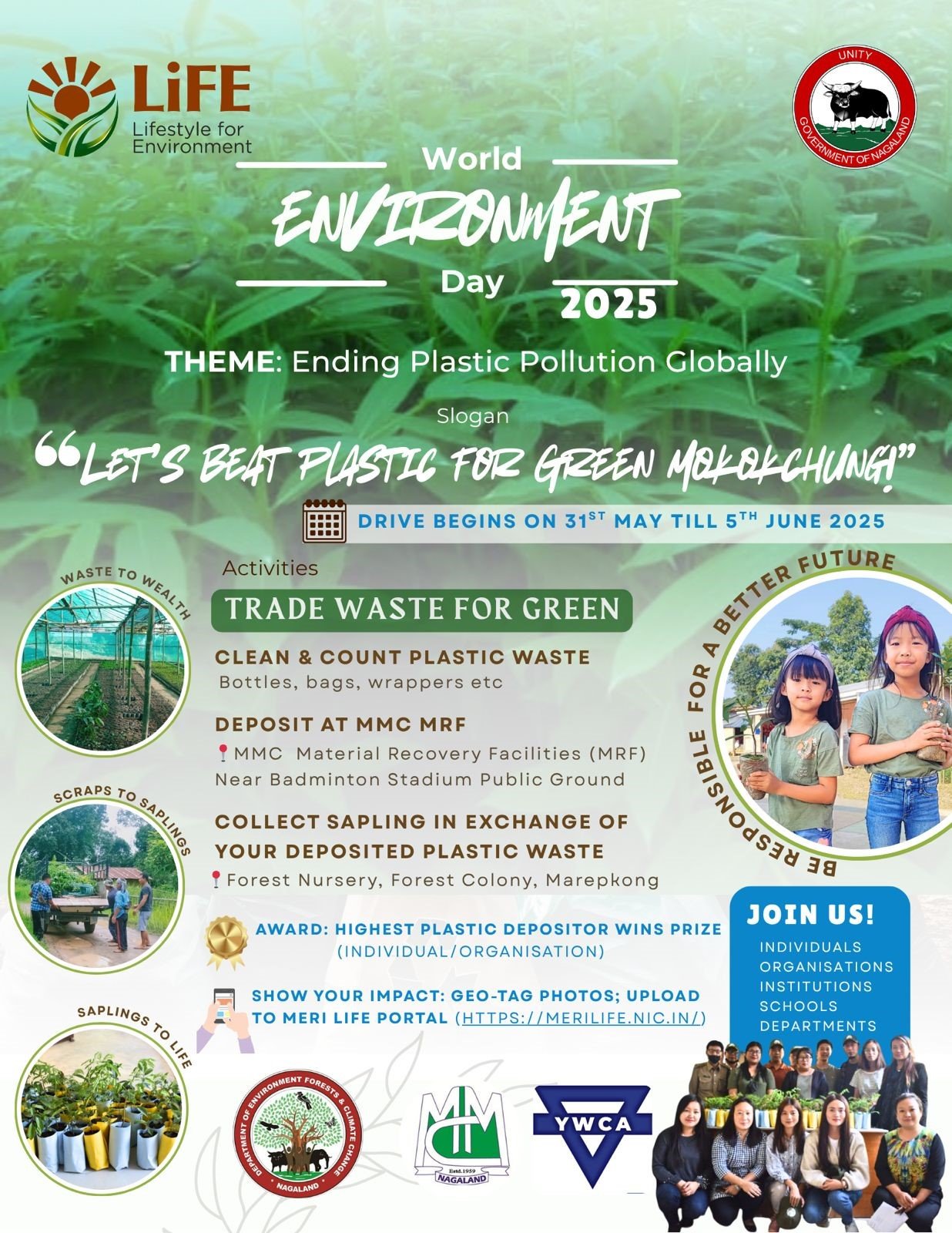To commemorate the upcoming World Environment Day 2025, Mokokchung district will be launching a week-long plastic waste collection campaign with the slogan “Trade Waste for Green” from May 31 to June 5. The campaign is being organized under the national theme “Ending Plastic Pollution Globally” with a local slogan “Let’s Beat Plastic for a Green Mokokchung”. The initiative is led by the Divisional Forest Officer Dr. Sentitula in collaboration with the Municipal Council, YWCA, department of Environment, Forest and Climate Change, and other stakeholders. The campaign calls on individuals, schools, organizations, institutions, and government departments to deposit plastic waste in exchange for tree saplings.
Dr. Sentitula said the campaign is intended to directly engage the community in waste reduction while promoting reforestation. “This is a participatory step to reduce plastic use, encourage segregation, and introduce a habit of localised recycling and greening,” she said.
Download Nagaland Tribune app on Google Play

The collection process involves three steps— clean and count plastic waste such as bottles, bags, and wrappers; deposit the waste at the municipal Material Recovery Facility (MRF) located near the Badminton Stadium Public Ground; collect a sapling in exchange from the forest nursery in Forest Colony, Marepkong.
Participants are encouraged to take geo-tagged photos of their involvement and upload them to the Meri LiFE portal (https://merilife.nic.in ) for record and monitoring.
As an incentive, the individual or organization that deposits the highest quantity of plastic waste will be awarded a prize. According to data presented by the Forest department, northeast India generates over 500 metric tons of plastic waste every day, with Nagaland contributing approximately 160 metric tons of solid waste daily, 8–12% of which is plastic. This amounts to around 6,000–7,000 tons of plastic waste annually. Mokokchung alone generates 1.5–2 tons of plastic waste each month, most of which is currently dumped or openly burned due to the absence of formal recycling infrastructure.
Dr. Sentitula noted that this unscientific disposal releases toxic pollutants like dioxins and furans, harming air and soil quality. She said Mokokchung’s mountainous terrain and lack of access to centralized waste processing units present major logistical challenges, making localized and community-based solutions essential.
The campaign also ties into the broader “Lifestyle for Environment (LiFE)” movement and the government’s push toward a circular economy. The DFO said that apart from immediate cleanup and reforestation, the campaign aims to build momentum for establishing decentralized recycling units in Nagaland, inspired by working models in Sikkim and Odisha.

Stakeholders are also exploring the conversion of plastic waste into energy, its use in road construction, and conversion into compost and organic fertilizers for local revenue generation. These solutions could reduce dependency on landfills and create green job opportunities. The campaign targets the planting of more than one lakh saplings and expects to involve participants from every section of society. All verified data and progress updates will be submitted to the Meri LiFE portal for government tracking.
Dr. Sentitula informed that the drive also aims to push Extended Producer Responsibility (EPR) among local businesses. Businesses are being encouraged to reduce plastic packaging and shift to sustainable alternatives like paper, jute, or cloth bags. NGOs and civil society organizations can support the campaign by funding recycling infrastructure, sapling distribution, and skill-building for waste workers.
She added that campaigns like this can indirectly support urban biodiversity, community empowerment, policy development, and local tourism. “Though the event is for a week, the goal is long-term. This is the beginning of structured, sustainable waste governance in Mokokchung,” she said.
The campaign will end on June 5, but officials hope it will lay the groundwork for a permanent behavioural shift in how the district manages waste and protects its environment.

